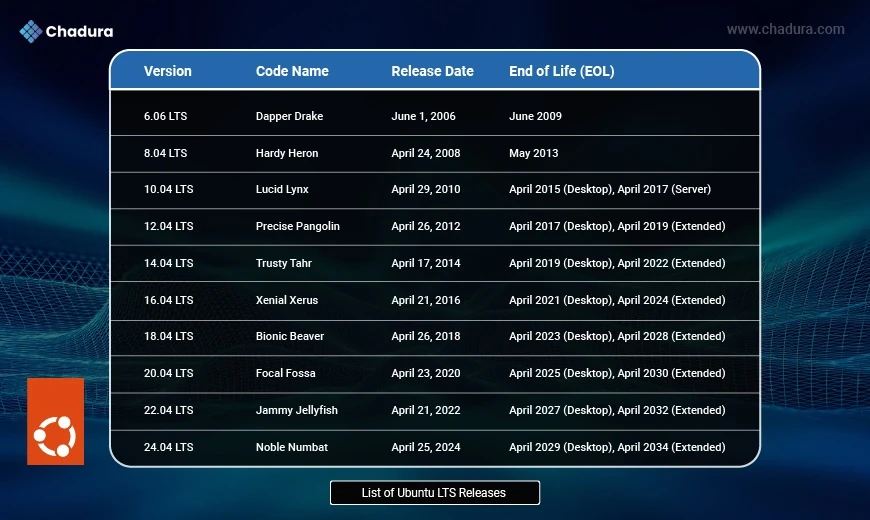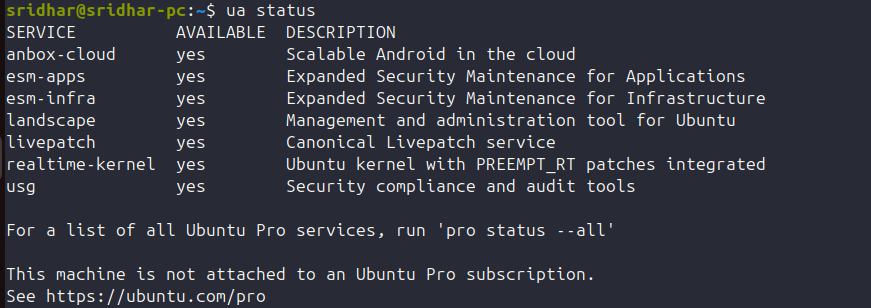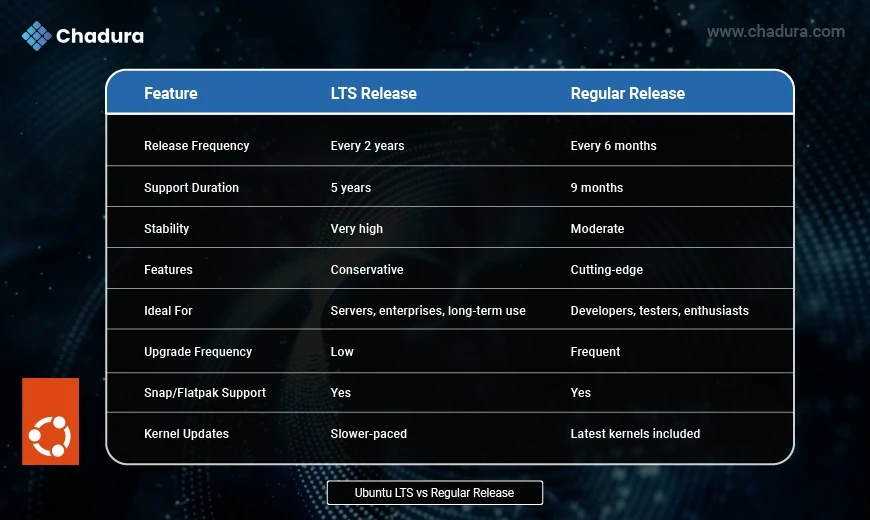Ubuntu is one of the most widely used Linux distros among software developers and other content creators. Ubuntu also powers many servers around the globe.
Canonical, the company responsible for developing Ubuntu, releases two versions of the distribution every year. There are two main types of Ubuntu releases, namely regular releases and long-term support releases. Let's take a look at some reasons why you should opt for LTS releases of Ubuntu.
Ubuntu
Ubuntu is a free and open-source Linux-based operating system developed by Canonical Ltd. It is known for its user-friendly interface, strong community support, and reliability. Ubuntu is widely used on desktops, servers, and cloud platforms, making it a popular choice for individuals, developers, and enterprises.
Ubuntu is a modern, secure, and versatile Linux distribution based on Debian, developed and maintained by Canonical Ltd. It is designed to provide a stable, easy-to-use environment for personal computers, servers, and IoT devices. Ubuntu supports a wide range of applications, programming languages, and hardware platforms, making it ideal for both beginners and professionals.
Download/ Install Ubuntu
- Ubuntu Desktop - Click here
- Ubuntu Server- Click here
- Ubuntu Info - Click here
Ubuntu LTS
LTS stands for Long Term Support. In the case of Ubuntu, the LTS versions get five years of support with routine security and maintenance updates from the date of its release. After five years, you’ll either need to upgrade to a new Ubuntu version, or you can buy Ubuntu Pro to get five additional years of support and updates. There’s also a Legacy Support program as a part of Ubuntu Pro which adds two more years of support, bringing the total support lifetime to 12 years for an LTS version.
In contrast, the non-LTS versions are only supported for nine months, at which point you’ll need to upgrade to a new version of Ubuntu as you stop receiving security and maintenance updates.
It’s worth noting that Ubuntu versions follow a year.month number scheme with new releases coming out every six months, in April and November. The LTS versions come out every two years in April of even-numbered years.
For example, at the time of writing, the current LTS version is Ubuntu 24.04 LTS, which was released in April 2024. The latest non-LTS version, Ubuntu 24.10, came out in October 2024. Following this schedule, we'll see two more non-LTS versions—Ubuntu 25.04 and Ubuntu 25.10. The next LTS release arrives in April 2026: Ubuntu 26.04 LTS.

Advantages of Ubuntu LTS Releases
1. Stability
Ubuntu LTS versions are supported and receive standard updates for a long time, five years to be precise. This means that you do not need to carry out major updates often on your system which can affect other critical software running on your PC or server. Also, not many system administrators or PC owners have the luxury of time to be upgrading to a major release every six months.
A stable system is far more important to system administrators and software engineers than having bleeding-edge updates or the latest shiny GUI.
Getting updates over a long period, as is the case with LTS releases means that your system is more secure and stable over the long run.
2. Support
One of the critical factors to consider when deciding on which version of Ubuntu you should use is the kind of support that you will get if something goes wrong. Support mainly comes in two forms: support from the Ubuntu community and direct support from the Canonical team.
For businesses and individuals running critical systems, it is important that you get help from Canonical when faced with technical difficulties on your Ubuntu setup. With LTS versions it is easy to get this kind of support.
In addition, Ubuntu LTS releases can be transitioned into Extended Security Maintenance (ESM) if the five-year support comes to an end, which allows you to continue getting critical updates and support from Canonical.
You can check the status of your Ubuntu Advantage subscription by running the following command:
ua status
3. Better Compatibility and Integration
Ubuntu LTS releases are usually very well tested and polished in comparison to regular releases. This stability and robustness allow for better integration and compatibility with other software systems and hardware.
Also, third-party software vendors tend to have good documentation for installation guides and setup instructions for Ubuntu LTS releases. Take, for example, the Microsoft SQL Server database, which is mainly supported on LTS versions of Ubuntu. Installing Microsoft SQL Server on regular releases is not as easy and there are no installation guides for regular releases on the official site.
Canonical estimates that 95 percent of Ubuntu users run LTS releases. This means you are more likely to get better community support on forums such as Stack Overflow if you encounter issues with your LTS release. In addition, you get better backward compatibility with other software systems and hardware.
Ubuntu LTS vs Regular Release

Key Features of Ubuntu LTS
Five Years of Updates
You’ll receive updates for security and software stability for a full five years (10 with Ubuntu Pro).
- Stable Software Versions
LTS releases prioritize stability over the newest features. This ensures compatibility for software and hardware over time. - Long-Term Kernel and Hardware Support
Hardware Enablement (HWE) stacks bring newer kernels and drivers to LTS versions without upgrading the full OS. - Certified by OEMs and Cloud Providers
LTS versions are tested and certified for many systems from Dell, HP, Lenovo, AWS, Azure, and Google Cloud. - Support for Snap & Flatpak
Users can still install newer applications via containerized formats like Snap or Flatpak, even on older LTS bases.
Which One Should You Choose?
- For Enterprises, Long-Term Projects, or Servers: Go with Ubuntu LTS. Stability and long-term support are critical.
- For Developers or Tech Enthusiasts: Regular releases let you explore new features and bleeding-edge tools.
- For Casual Desktop Use: If you don’t want to upgrade frequently, stick with LTS. But if you like experimenting, try regular releases.
Pro Tip: You Can Mix!
Even if you run an LTS base, you can install latest software using Snap, Flatpak, PPAs, or AppImages—allowing you to enjoy both stability and new tools.
Regular Releases
Pros:
- Latest kernel and software
- New features, UI improvements, and hardware support
- Great for testing and development
Cons:
- Only 9 months of support
- Requires frequent upgrades
- Less stable than LTS
Conclusion
Ubuntu LTS (Long-Term Support) stands as the gold standard for stability, security, and performance in the Linux ecosystem. With its extended support cycle, consistent updates, and enterprise-grade reliability, it’s the preferred choice for developers, businesses, and system administrators alike. Whether you're setting up a server, developing applications, or deploying cloud infrastructure, Ubuntu LTS offers a worry-free environment that’s built to last. If you value long-term consistency over frequent changes, Ubuntu LTS is the smart and dependable path forward.





